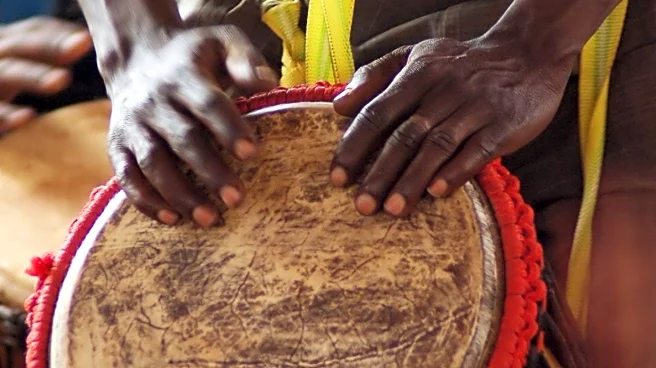What's Happening?
Mali's once-thriving music scene, renowned for its global influence and cultural significance, is facing severe challenges due to economic hardships and security threats. The country's music industry, which has produced international stars like Salif Keïta and Ali Farka Touré, is struggling as Islamist militants regain control over large parts of the country. The economic crisis, exacerbated by the policies of a military junta and international sanctions, has further strained the industry. Musicians like Oumar Konaté, known as the 'Jimmy Hendrix of West Africa,' are finding it difficult to sustain their careers, with many venues in the capital, Bamako, experiencing low attendance and closures. The situation is compounded by the suspension of major cultural events like the Festival au Désert, once a hub for international artists.
Why It's Important?
The decline of Mali's music scene has significant cultural and economic implications. Music has been a vital part of Mali's identity, serving as a bridge between diverse communities and a source of national pride. The industry's downturn threatens the livelihoods of musicians and related businesses, potentially leading to a loss of cultural heritage. The inability to perform and tour internationally due to security concerns and visa restrictions further isolates Malian artists from the global stage. This situation highlights the broader impact of political instability and economic sanctions on cultural sectors, which are often overlooked in discussions about national crises.
What's Next?
In response to the crisis, Mali's military government has declared 2025 the 'Year of Culture' to promote national unity and attract economic investment. Plans are underway for a large festival in Timbuktu in December, aiming to revive the music scene and showcase the country's cultural resilience. However, the success of these initiatives depends on improving security conditions and addressing economic challenges. Musicians and cultural leaders are hopeful but cautious, as the ongoing instability poses significant risks to these efforts.
Beyond the Headlines
The challenges facing Mali's music scene reflect broader issues of cultural preservation in conflict zones. The loss of traditional music and the inability to pass it on to future generations could lead to a cultural void. Additionally, the situation raises ethical questions about the role of international aid and sanctions in cultural preservation. As Mali navigates its political and economic crises, the survival of its music scene will be a critical indicator of the country's ability to maintain its cultural identity.









